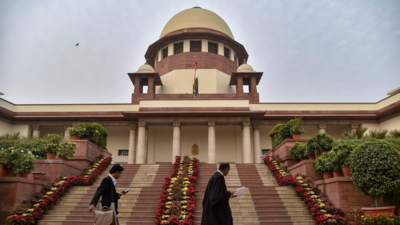
NEW DELHI: Supreme Courtroom on Tuesday mentioned that minorities don’t have any absolute proper to manage academic establishments, whereas upholding the validity of Uttar Pradesh Board of Madrasa Schooling Act, 2004 – a call that may clear the uncertainty hanging over 13,364 madrassas within the state with over 12 lakh college students since March 22 when Allahabad excessive courtroom had struck down the Act terming it “non-secular” and therefore “unconstitutional”.
An SC bench of CJI D Y Chandrachud and Justices J B Pardiwala and Manoj Misra mentioned that the excessive courtroom erred in quashing the statute and ordering shifting of the scholars to common colleges below UP Schooling Board.
State laws can’t search to control increased edu, says SC
The SC bench dominated that the fitting of minorities to manage academic establishments was not absolute and the board may train its regulatory energy with approval of the state govt to make sure that non secular minority establishments imparted secular training of a requisite customary with out destroying their minority character.
Writing the 70-page judgment, CJI Chandrachud mentioned, “The appropriate of minorities to manage academic establishments isn’t absolute. The state has an curiosity in sustaining the requirements of training in minority academic establishments and will impose regulation as a situation for grant of help or recognition.”
The CJI mentioned the state has a constitutional obligation to strike a steadiness between two goals – guaranteeing the usual of excellence of minority academic establishments and preserving the fitting of minorities to ascertain and administer its academic establishments.
“State can regulate points of the requirements of training such because the course of research, qualification and appointment of lecturers, well being and hygiene of scholars, and services for libraries. Laws pertaining to requirements of training or qualification of lecturers don’t instantly intervene with the administration of the recognised madrassas. Such rules are designed to forestall maladministration of an academic establishment,” the SC mentioned.
It mentioned the 2004 Act didn’t intervene with the day-to-day administration of madrassas as its goal was regulatory in nature for enchancment of educational excellence of scholars. “The Madarsa Act is in step with the constructive obligation of the state to make sure that college students finding out in recognised madrassas attain a minimal stage of competency which is able to enable them to successfully take part in society and earn a residing,” it mentioned.
Nonetheless, the SC mentioned the Madarsa Act, to the extent to which it sought to control increased training, together with levels of Fazil (postgraduate) and Kamil (undergraduate), was past the legislative competence of the state legislature because it conflicted with the UGC Act, which governs the requirements for increased training. A state laws can not search to control increased training in contravention of the UGC Act, it mentioned.
The SC severed conferment of Fazil and Kamil levels from the functioning of the Madarsa Board and mentioned it may proceed to control madrassa training until Class 12. “The mere undeniable fact that the training which is sought to be regulated consists of some non secular teachings or instruction doesn’t mechanically push the laws (Madarsa Act) outdoors the legislative competence of the state,” it mentioned.
Referring to Article 28(3) which prohibits college students in state recognised and state-funded or aided academic establishments from being compelled to obtain non secular directions, the CJI mentioned, “The corollary to this provision is that non secular instruction could also be imparted in an academic establishment which is recognised by the state, or which receives state help however no pupil might be compelled to take part in non secular instruction in such an establishment.”


